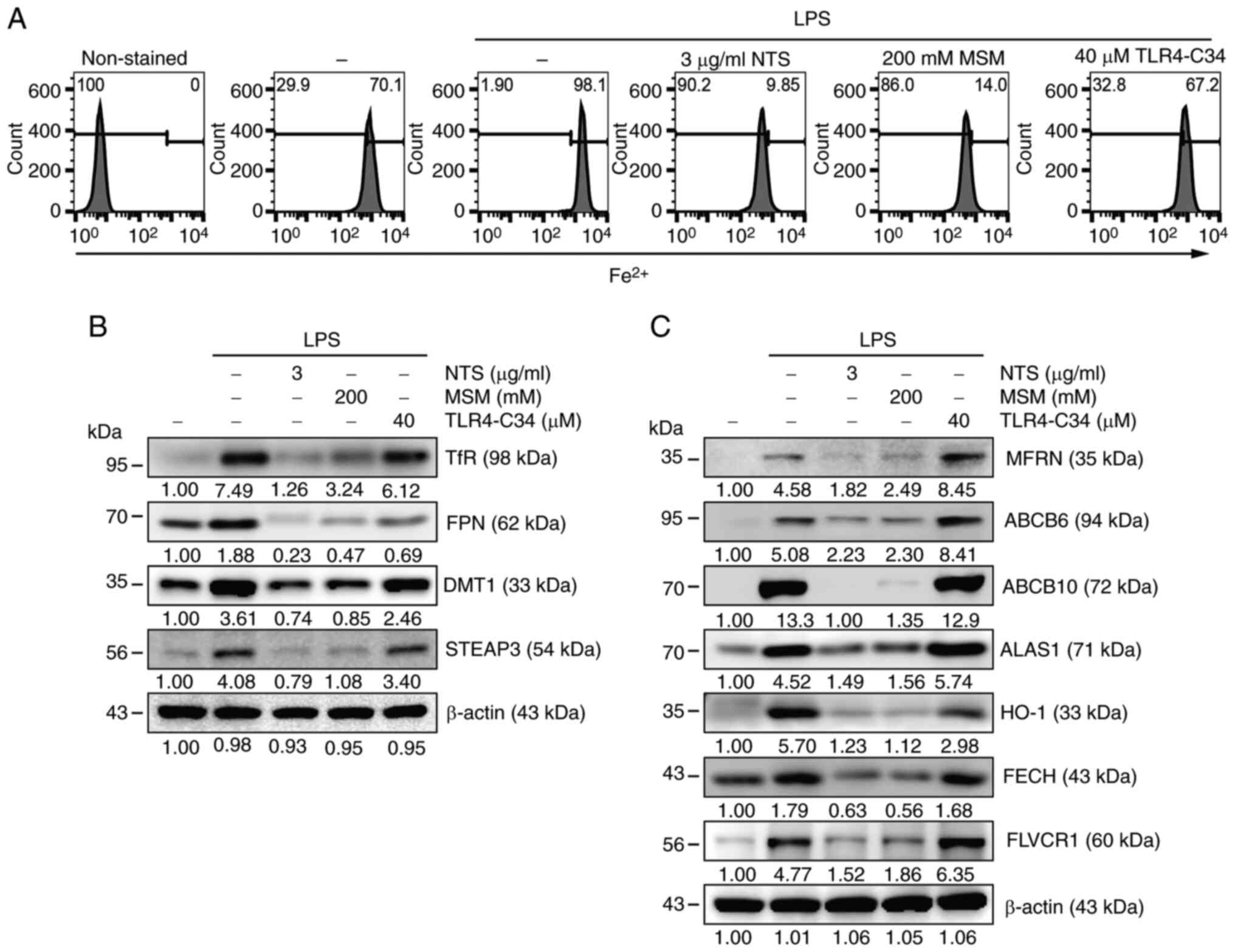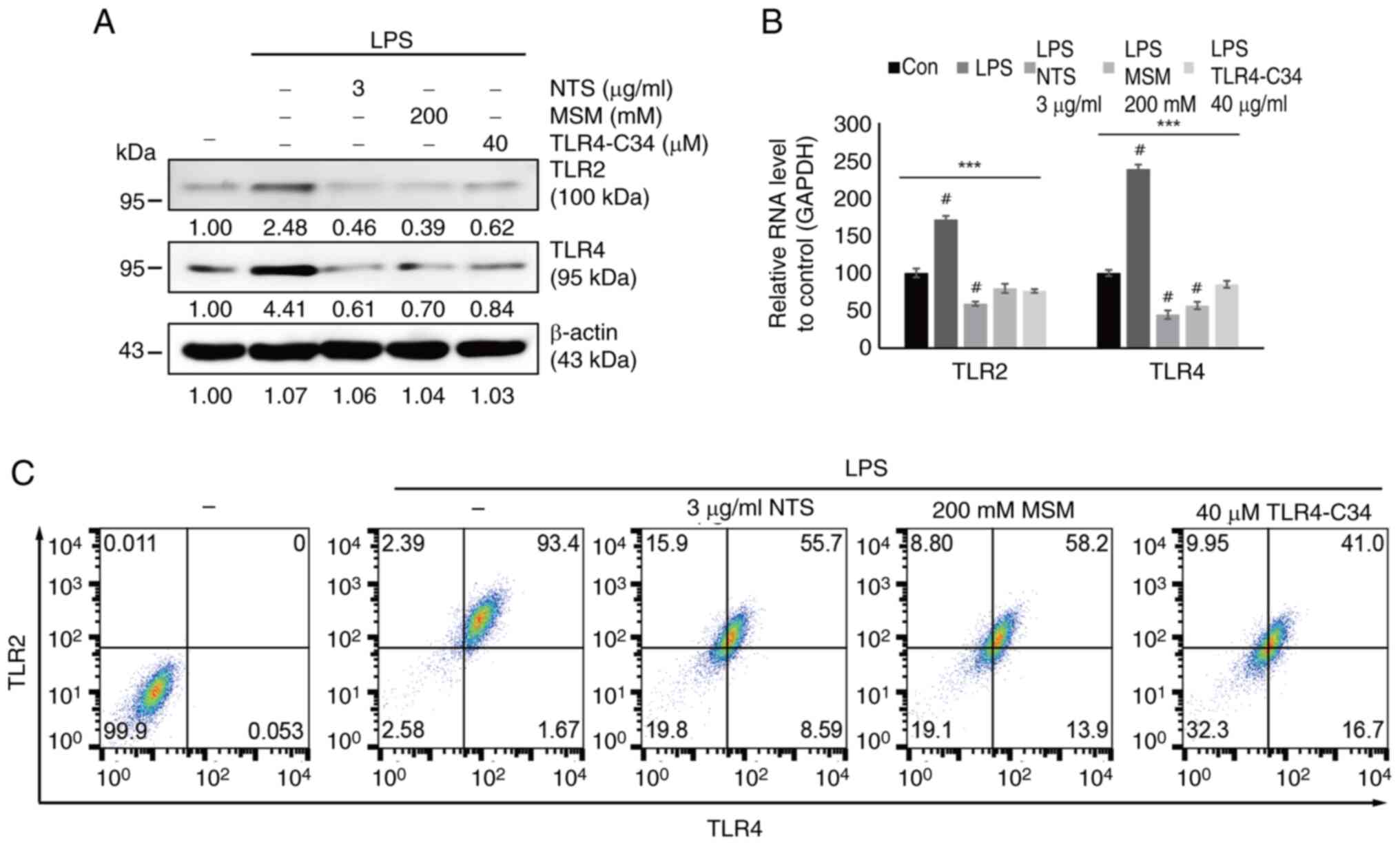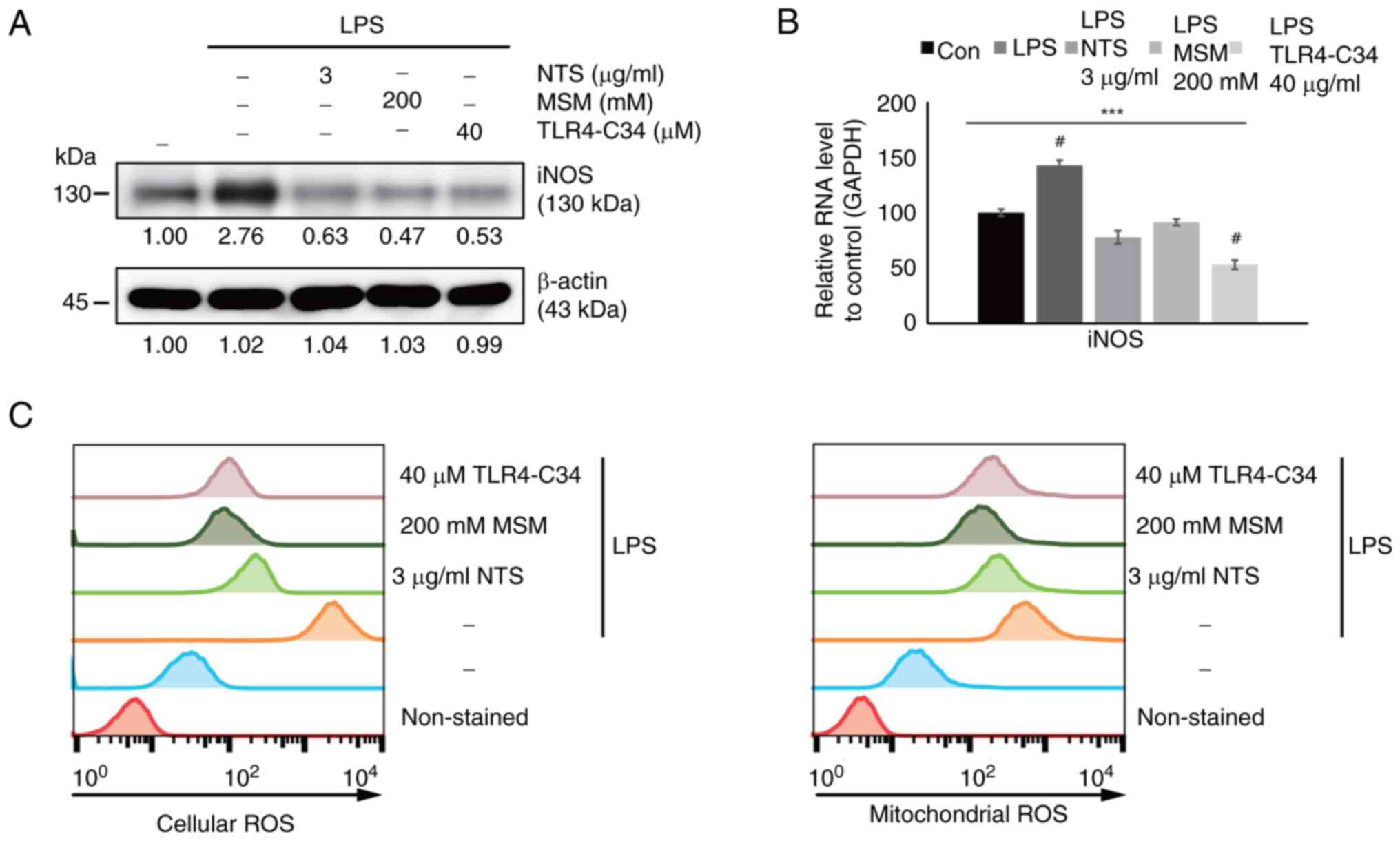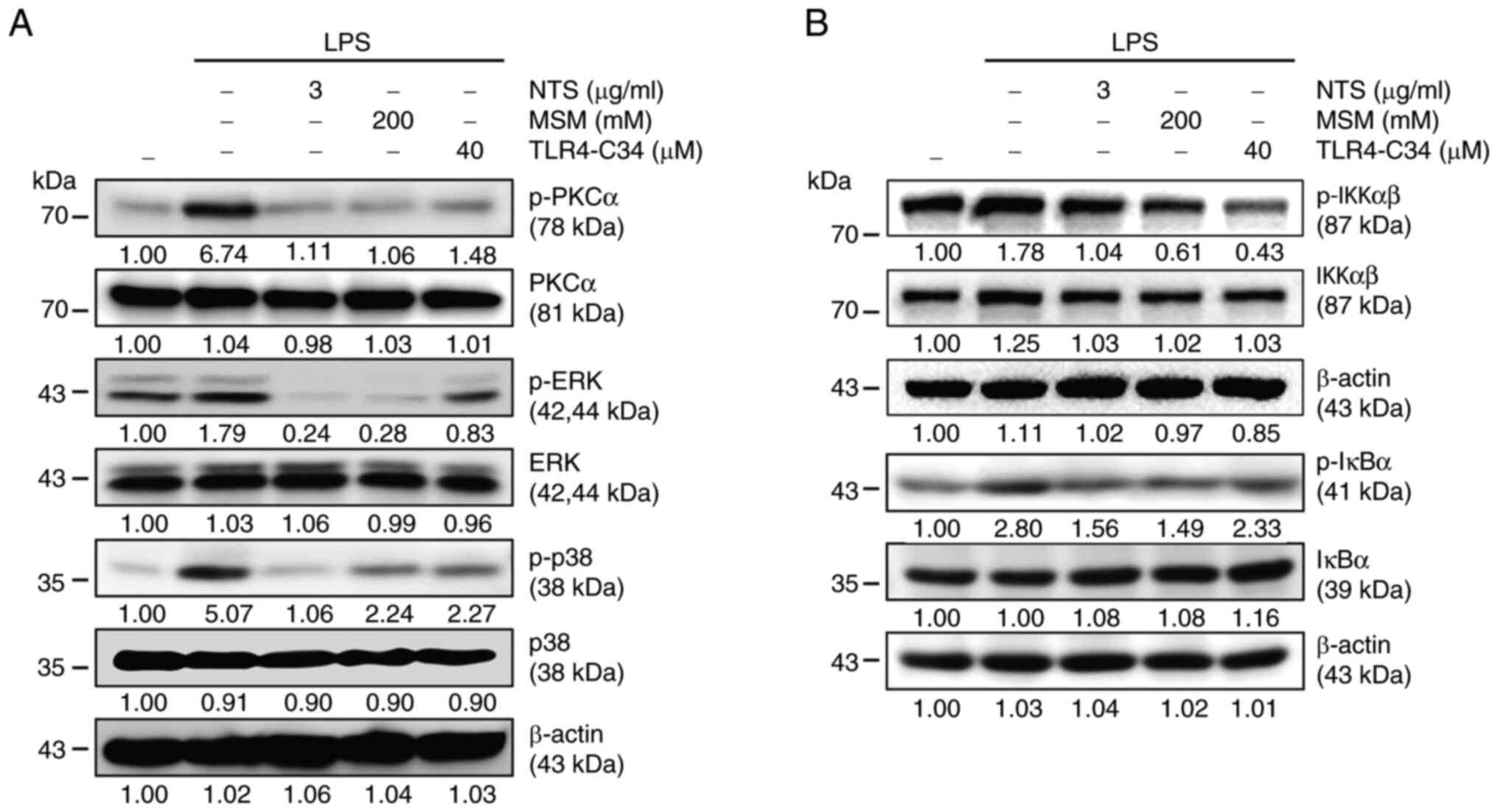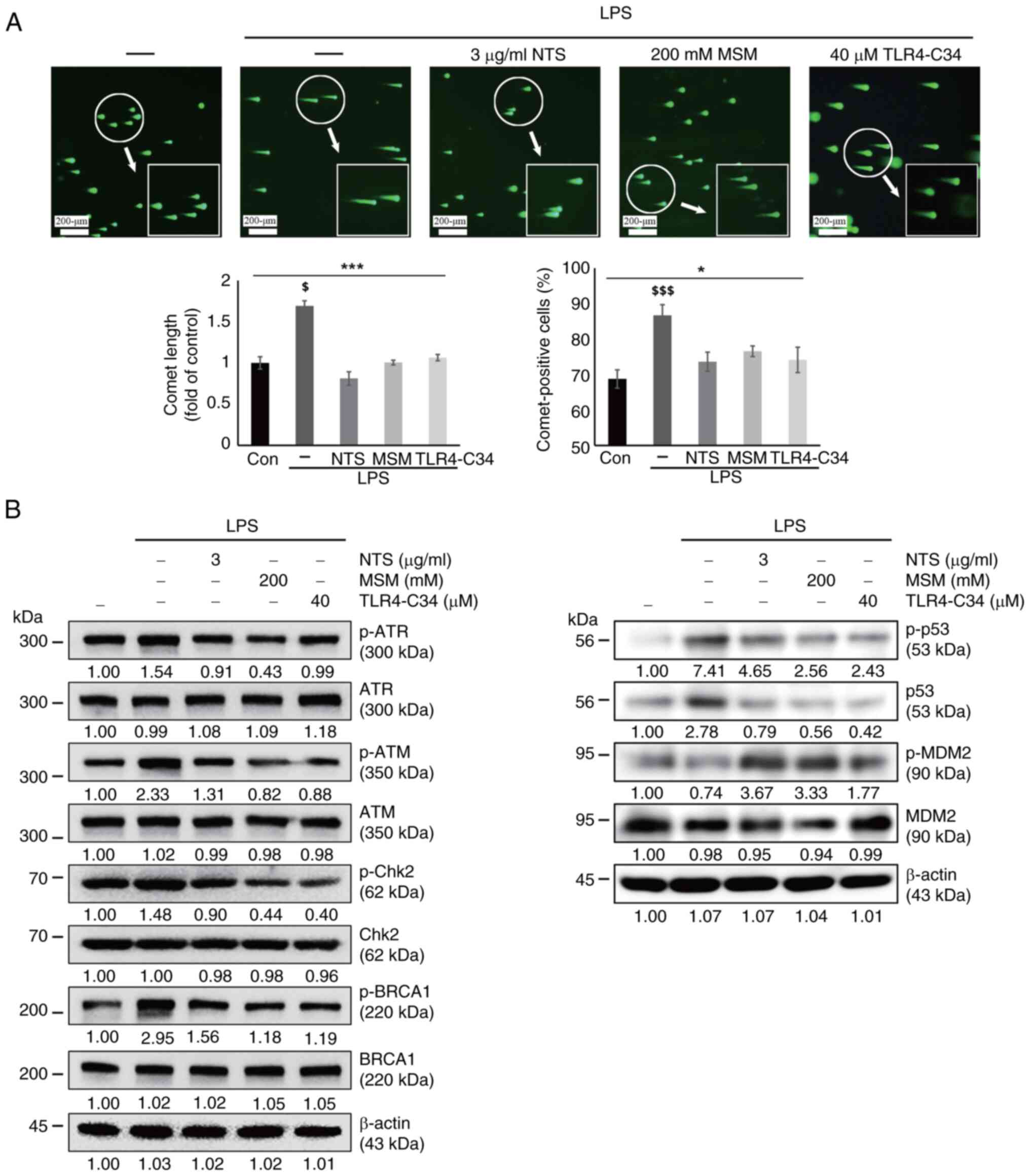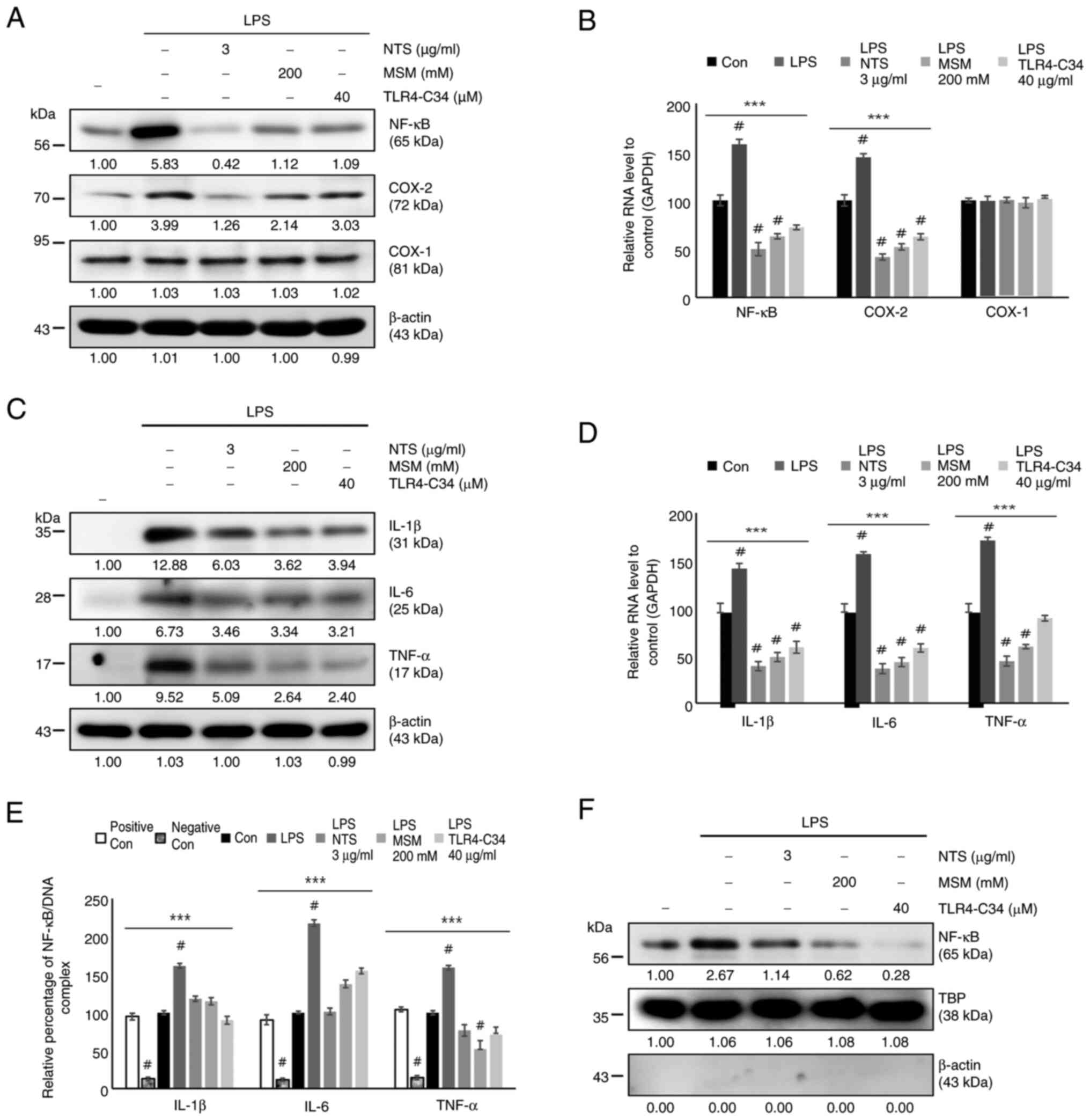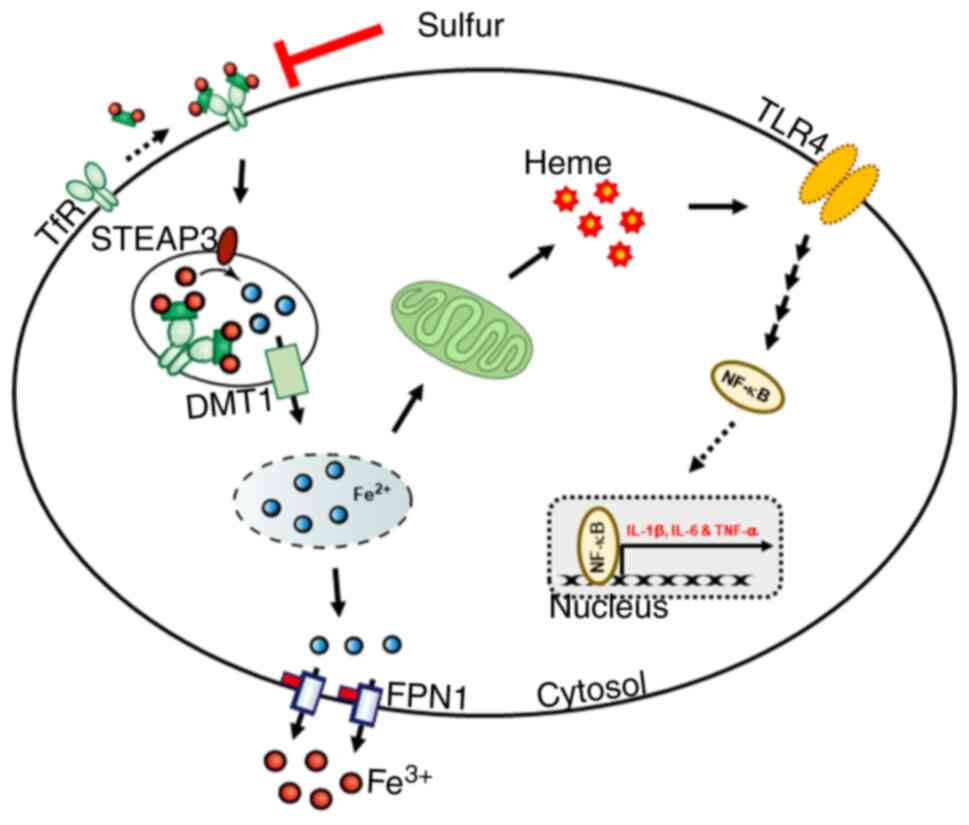|
1
|
Wessling-Resnick M: Iron homeostasis and
the inflammatory response. Annu Rev Nutr. 30:105–122. 2010.
View Article : Google Scholar : PubMed/NCBI
|
|
2
|
Martins AC, Almeida JI, Lima IS, Kapitao
AS and Gozzelino R: Iron metabolism and the inflammatory response.
IUBMB Life. 69:442–450. 2017. View
Article : Google Scholar : PubMed/NCBI
|
|
3
|
Alam Z, Devalaraja S, Li M, To TKJ,
Folkert IW, Mitchell-Velasquez E, Dang MT, Young P, Wilbur CJ,
Silverman MA, et al: Counter regulation of spic by NF-kappaB and
STAT signaling controls inflammation and iron metabolism in
macrophages. Cell Rep. 31:1078252020. View Article : Google Scholar : PubMed/NCBI
|
|
4
|
Wang L, Harrington L, Trebicka E, Shi HN,
Kagan JC, Hong CC, Lin HY, Babitt JL and Cherayil BJ: Selective
modulation of TLR4-activated inflammatory responses by altered iron
homeostasis in mice. J Clin Invest. 119:3322–3328. 2009.PubMed/NCBI
|
|
5
|
Kang DY, Sp N, Jo ES, Lee JM and Jang KJ:
New insights into the pivotal role of iron/Heme metabolism in
TLR4/NF-κB Signaling-mediated inflammatory responses in human
monocytes. Cells. 10:25492021. View Article : Google Scholar : PubMed/NCBI
|
|
6
|
Wagener FA, Volk HD, Willis D, Abraham NG,
Soares MP, Adema GJ and Figdor CG: Different faces of the heme-heme
oxygenase system in inflammation. Pharmacol Rev. 55:551–571. 2003.
View Article : Google Scholar : PubMed/NCBI
|
|
7
|
Sp N, Kang DY, Jo ES, Lee JM, Bae SW and
Jang KJ: Pivotal role of iron homeostasis in the induction of
mitochondrial apoptosis by 6-Gingerol through PTEN regulated PD-L1
expression in embryonic cancer cells. Front Oncol. 11:7817202021.
View Article : Google Scholar : PubMed/NCBI
|
|
8
|
Nath KA, Vercellotti GM, Grande JP,
Miyoshi H, Paya CV, Manivel JC, Haggard JJ, Croatt AJ, Payne WD and
Alam J: Heme protein-induced chronic renal inflammation:
Suppressive effect of induced heme oxygenase-1. Kidney Int.
59:106–117. 2001. View Article : Google Scholar : PubMed/NCBI
|
|
9
|
Wagener FADTG, Eggert A, Boerman OC, Oyen
WJ, Verhofstad A, Abraham NG, Adema G, van Kooyk Y, de Witte T and
Figdor CG: Heme is a potent inducer of inflammation in mice and is
counteracted by heme oxygenase. Blood. 98:1802–1811. 2001.
View Article : Google Scholar : PubMed/NCBI
|
|
10
|
Yucel G, Zhao Z, El-Battrawy I, Lan H,
Lang S, Li X, Buljubasic F, Zimmermann WH, Cyganek L, Utikal J, et
al: Lipopolysaccharides induced inflammatory responses and
electrophysiological dysfunctions in human-induced pluripotent stem
cell derived cardiomyocytes. Sci Rep. 7:29352017. View Article : Google Scholar : PubMed/NCBI
|
|
11
|
Sp N, Kang DY, Kim HD, Rugamba A, Jo ES,
Park JC, Bae SW, Lee JM and Jang KJ: Natural sulfurs inhibit
LPS-induced inflammatory responses through NF-κB signaling in
CCD-986Sk skin fibroblasts. Life-Basel. 11:4272021. View Article : Google Scholar : PubMed/NCBI
|
|
12
|
Piktel E, Wnorowska U, Ciesluk M, Deptula
P, Pogoda K, Misztalewska-Turkowicz I, Paprocka P,
Niemirowicz-Laskowska K, Wilczewska AZ, Janmey PA and Bucki R:
Inhibition of inflammatory response in human keratinocytes by
magnetic nanoparticles functionalized with PBP10 peptide derived
from the PIP2-binding site of human plasma gelsolin. J
Nanobiotechnology. 17:222019. View Article : Google Scholar : PubMed/NCBI
|
|
13
|
Rafi MM, Yadav PN and Rossi AO:
Glucosamine inhibits LPS-induced COX-2 and iNOS expression in mouse
macrophage cells (RAW 264.7) by inhibition of p38-MAP kinase and
transcription factor NF-kappaB. Mol Nutr Food Res. 51:587–593.
2007. View Article : Google Scholar : PubMed/NCBI
|
|
14
|
Bjorkbacka H, Kunjathoor VV, Moore KJ,
Koehn S, Ordija CM, Lee MA, Means T, Halmen K, Luster AD, Golenbock
DT and Freeman MW: Reduced atherosclerosis in MyD88-null mice links
elevated serum cholesterol levels to activation of innate immunity
signaling pathways. Nat Med. 10:416–421. 2004. View Article : Google Scholar : PubMed/NCBI
|
|
15
|
van der Merwe M and Bloomer RJ: The
influence of methylsulfonylmethane on inflammation-associated
cytokine release before and following strenuous exercise. J Sports
Med (Hindawi Publ Corp). 2016:74983592016.PubMed/NCBI
|
|
16
|
Koh E and Surh J: Influence of sulfur
fertilization on the antioxidant activities of onion juices
prepared by thermal treatment. Prev Nutr Food Sci. 21:160–164.
2016. View Article : Google Scholar : PubMed/NCBI
|
|
17
|
Preetha NS, Kang DY and Darvin P:
Induction of ketosis condition and suppression using
methylsulfonylmethane by altering ANGPTL3 expression through STAT5b
signaling mechanism. Anim Cells Syst. 19:30–38. 2015. View Article : Google Scholar
|
|
18
|
P NS, Kang DY, Kim BJ, Joung YH, Darvin P,
Byun HJ, Kim JG, Park JU and Yang YM: Methylsulfonylmethane induces
G1 arrest and mitochondrial apoptosis in YD-38 gingival cancer
cells. Anticancer Res. 37:1637–1646. 2017. View Article : Google Scholar : PubMed/NCBI
|
|
19
|
Kang DY, Sp N, Bae SW and Jang KJ:
Methylsulfonylmethane relieves cobalt chloride-induced hypoxic
toxicity in C2C12 myoblasts. Life Sci. 301:1206192022. View Article : Google Scholar : PubMed/NCBI
|
|
20
|
S PN, Darvin P, Yoo YB, Joung YH, Kang DY,
Kim DN, Hwang TS, Kim SY, Kim WS, Lee HK, et al: The combination of
methylsulfonylmethane and tamoxifen inhibits the Jak2/STAT5b
pathway and synergistically inhibits tumor growth and metastasis in
ER-positive breast cancer xenografts. BMC Cancer. 15:4742015.
View Article : Google Scholar : PubMed/NCBI
|
|
21
|
Kim DH, Nipin SP, Kang DY, Jo ES, Rugamba
A, Jang KJ and Yang YM: Effect of methylsulfonylmethane on
proliferation and apoptosis of A549 lung cancer cells through G/M
Cell-cycle arrest and intrinsic cell death pathway. Anticancer Res.
40:1905–1913. 2020. View Article : Google Scholar : PubMed/NCBI
|
|
22
|
Sousa-Lima I, Park SY, Chung M, Jung HJ,
Kang MC, Gaspar JM, Seo JA, Macedo MP, Park KS, Mantzoros C, et al:
Methylsulfonylmethane (MSM), an organosulfur compound, is effective
against obesity-induced metabolic disorders in mice. Metabolism.
65:1508–1521. 2016. View Article : Google Scholar : PubMed/NCBI
|
|
23
|
Miller L, Thompson K, Pavlenco C, Mettu
VS, Haverkamp H, Skaufel S, Basit A, Prasad B and Larsen J: The
effect of daily methylsulfonylmethane (MSM) consumption on
High-density lipoprotein cholesterol in healthy overweight and
obese adults: A randomized controlled trial. Nutrients.
13:36202021. View Article : Google Scholar : PubMed/NCBI
|
|
24
|
Miller LE: Methylsulfonylmethane decreases
inflammatory response to tumor necrosis factor-alpha in cardiac
cells. Am J Cardiovasc Dis. 8:31–38. 2018.PubMed/NCBI
|
|
25
|
Caron JM, Bannon M, Rosshirt L, Luis J,
Monteagudo L, Caron JM and Sternstein GM: Methyl sulfone induces
loss of metastatic properties and reemergence of normal phenotypes
in a metastatic cloudman S-91 (M3) murine melanoma cell line. PLoS
One. 5:e117882010. View Article : Google Scholar : PubMed/NCBI
|
|
26
|
Kim YB, Lee SH, Kim DH, Lee HG, Choi Y,
Lee SD and Lee KW: Effects of dietary organic and inorganic sulfur
on laying performance, egg quality, ileal morphology, and
antioxidant capacity in laying hens. Animals (Basel). 12:872021.
View Article : Google Scholar : PubMed/NCBI
|
|
27
|
Lee JS, Kwon JK, Han SH, An IJ, Kim SJ,
Lee SH, Park YS, Park BK, Kim BS, Kim S, et al: Toxicity study of
detoxication sulphur at 3 months post-treatment in rats. J Food
Hygiene Safety. 25:263–268. 2010.
|
|
28
|
Kang DY, Sp N, Jo ES, Kim HD, Kim IH, Bae
SW, Jang KJ and Yang YM: Non-toxic sulfur enhances growth hormone
signaling through the JAK2/STAT5b/IGF-1 pathway in C2C12 cells. Int
J Mol Med. 45:931–938. 2020.PubMed/NCBI
|
|
29
|
Kang DY, Sp N, Jo ES, Rugamba A, Kim HD,
Kim IH, Park JC, Bae SW, Jang KJ and Yang YM: Non-toxic sulfur
inhibits LPS-induced inflammation by regulating TLR-4 and
JAK2/STAT3 through IL-6 signaling. Mol Med Rep. 24:4852021.
View Article : Google Scholar : PubMed/NCBI
|
|
30
|
Jo ES, Sp N, Kang DY, Rugamba A, Kim IH,
Bae SW, Liu Q, Jang KJ and Yang YM: Sulfur compounds inhibit high
Glucose-induced inflammation by regulating NF-κB signaling in human
monocytes. Molecules. 25:23422020. View Article : Google Scholar : PubMed/NCBI
|
|
31
|
Livak KJ and Schmittgen TD: Analysis of
relative gene expression data using real-time quantitative PCR and
the 2(−Delta Delta C(T)) method. Methods. 25:402–408. 2001.
View Article : Google Scholar : PubMed/NCBI
|
|
32
|
Qiao W, Huang Y, Bian Z, Sun X, Wang X,
Gao Q, Peng Y and Meng L: Lipopolysaccharide-induced DNA damage
response activates nuclear factor κB signalling pathway via GATA4
in dental pulp cells. Int Endod J. 52:1704–1715. 2019. View Article : Google Scholar : PubMed/NCBI
|
|
33
|
Lee DY, Li H, Lim HJ, Lee HJ, Jeon R and
Ryu JH: Anti-inflammatory activity of sulfur-containing compounds
from garlic. J Med Food. 15:992–999. 2012. View Article : Google Scholar : PubMed/NCBI
|
|
34
|
Soares P, Silva C, Chavarria D, Silva FSG,
Oliveira PJ and Borges F: Drug discovery and amyotrophic lateral
sclerosis: Emerging challenges and therapeutic opportunities.
Ageing Res Rev. 83:1017902023. View Article : Google Scholar : PubMed/NCBI
|
|
35
|
Osterholm EA and Georgieff MK: Chronic
inflammation and iron metabolism. J Pediatr. 166:1351–1357.e1.
2015. View Article : Google Scholar : PubMed/NCBI
|
|
36
|
Zhang MW, Yang G, Zhou YF, Qian C, Mu MD,
Ke Y and Qian ZM: Regulating ferroportin-1 and transferrin
receptor-1 expression: A novel function of hydrogen sulfide. J Cell
Physiol. 234:3158–3169. 2019. View Article : Google Scholar : PubMed/NCBI
|
|
37
|
Latunde-Dada GO, Van der Westhuizen J,
Vulpe CD, Anderson GJ, Simpson RJ and McKie AT: Molecular and
functional roles of duodenal cytochrome B (Dcytb) in iron
metabolism. Blood Cells Mol Dis. 29:356–360. 2002. View Article : Google Scholar : PubMed/NCBI
|
|
38
|
Fleming MD, Romano MA, Su MA, Garrick LM,
Garrick MD and Andrews NC: Nramp2 is mutated in the anemic Belgrade
(b) rat: Evidence of a role for Nramp2 in endosomal iron transport.
Proc Natl Acad Sci USA. 95:1148–1153. 1998. View Article : Google Scholar : PubMed/NCBI
|
|
39
|
Byrne SL, Krishnamurthy D and
Wessling-Resnick M: Pharmacology of iron transport. Annu Rev
Pharmacol Toxicol. 53:17–36. 2013. View Article : Google Scholar : PubMed/NCBI
|
|
40
|
Richardson DR, Lane DJR, Becker EM, Huang
ML, Whitnall M, Suryo Rahmanto Y, Sheftel AD and Ponka P:
Mitochondrial iron trafficking and the integration of iron
metabolism between the mitochondrion and cytosol. Proc Natl Acad
Sci USA. 107:10775–10782. 2010. View Article : Google Scholar : PubMed/NCBI
|
|
41
|
Chiabrando D, Mercurio S and Tolosano E:
Heme and erythropoieis: More than a structural role. Haematologica.
99:973–983. 2014. View Article : Google Scholar : PubMed/NCBI
|
|
42
|
Chen W, Paradkar PN, Li LT, Pierce EL,
Langer NB, Takahashi-Makise N, Hyde BB, Shirihai OS, Ward DM,
Kaplan J and Paw BH: Abcb10 physically interacts with mitoferrin-1
(Slc25a37) to enhance its stability and function in the erythroid
mitochondria. Proc Natl Acad Sci USA. 106:16263–16268. 2009.
View Article : Google Scholar : PubMed/NCBI
|
|
43
|
Chen W, Dailey HA and Paw BH:
Ferrochelatase forms an oligomeric complex with mitoferrin-1 and
Abcb10 for erythroid heme biosynthesis. Blood. 116:628–630. 2010.
View Article : Google Scholar : PubMed/NCBI
|
|
44
|
Chiabrando D, Marro S, Mercurio S, Giorgi
C, Petrillo S, Vinchi F, Fiorito V, Fagoonee S, Camporeale A, Turco
E, et al: The mitochondrial heme exporter FLVCR1b mediates
erythroid differentiation. J Clin Invest. 122:4569–4579. 2012.
View Article : Google Scholar : PubMed/NCBI
|
|
45
|
Yu B, Li Q and Zhou M: LPS-induced
upregulation of the TLR4 signaling pathway inhibits osteogenic
differentiation of human periodontal ligament stem cells under
inflammatory conditions. Int J Mol Med. 43:2341–2351.
2019.PubMed/NCBI
|
|
46
|
Ngkelo A, Meja K, Yeadon M, Adcock I and
Kirkham PA: LPS induced inflammatory responses in human peripheral
blood mononuclear cells is mediated through NOX4 and Giα dependent
PI-3kinase signalling. J Inflamm (Lond). 9:12012. View Article : Google Scholar : PubMed/NCBI
|
|
47
|
Xiang PJ, Chen T, Mou Y, Wu H, Xie P, Lu
G, Gong X, Hu Q, Zhang Y and Ji H: NZ suppresses TLR4/NF-κB
signalings and NLRP3 inflammasome activation in LPS-induced
RAW264.7 macrophages. Inflamm Res. 64:799–808. 2015. View Article : Google Scholar : PubMed/NCBI
|
|
48
|
Zusso M, Lunardi V, Franceschini D,
Pagetta A, Lo R, Stifani S, Frigo AC, Giusti P and Moro S:
Ciprofloxacin and levofloxacin attenuate microglia inflammatory
response via TLR4/NF-kB pathway. J Neuroinflammation. 16:1482019.
View Article : Google Scholar : PubMed/NCBI
|
|
49
|
Sun SC: The non-canonical NF-κB pathway in
immunity and inflammation. Nat Rev Immunol. 17:545–558. 2017.
View Article : Google Scholar : PubMed/NCBI
|
|
50
|
Dasu MR, Devaraj S and Jialal I: High
glucose induces IL-1beta expression in human monocytes: Mechanistic
insights. Am J Physiol Endocrinol Metab. 293:E337–E346. 2007.
View Article : Google Scholar : PubMed/NCBI
|
|
51
|
Lee JS and Surh YJ: Nrf2 as a novel
molecular target for chemoprevention. Cancer Lett. 224:171–184.
2005. View Article : Google Scholar : PubMed/NCBI
|
|
52
|
Zhang XQ, Wang CH, Shan S, Liu XY, Jiang
ZM and Ren T: TLR4/ROS/miRNA-21 pathway underlies
lipopolysaccharide instructed primary tumor outgrowth in lung
cancer patients. Oncotarget. 7:42172–42182. 2016. View Article : Google Scholar : PubMed/NCBI
|
|
53
|
Lee CW, Kim SC, Kwak TW, Lee JR, Jo MJ,
Ahn YT, Kim JM and An WG: Anti-Inflammatory effects of
Bangpungtongsung-San, a traditional herbal prescription. Evid Based
Complement Alternat Med. 2012:8929432012. View Article : Google Scholar : PubMed/NCBI
|















